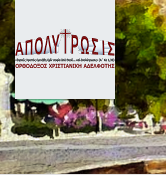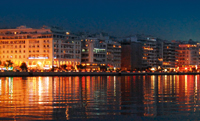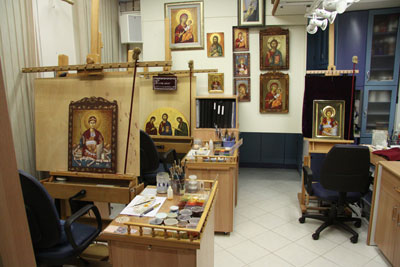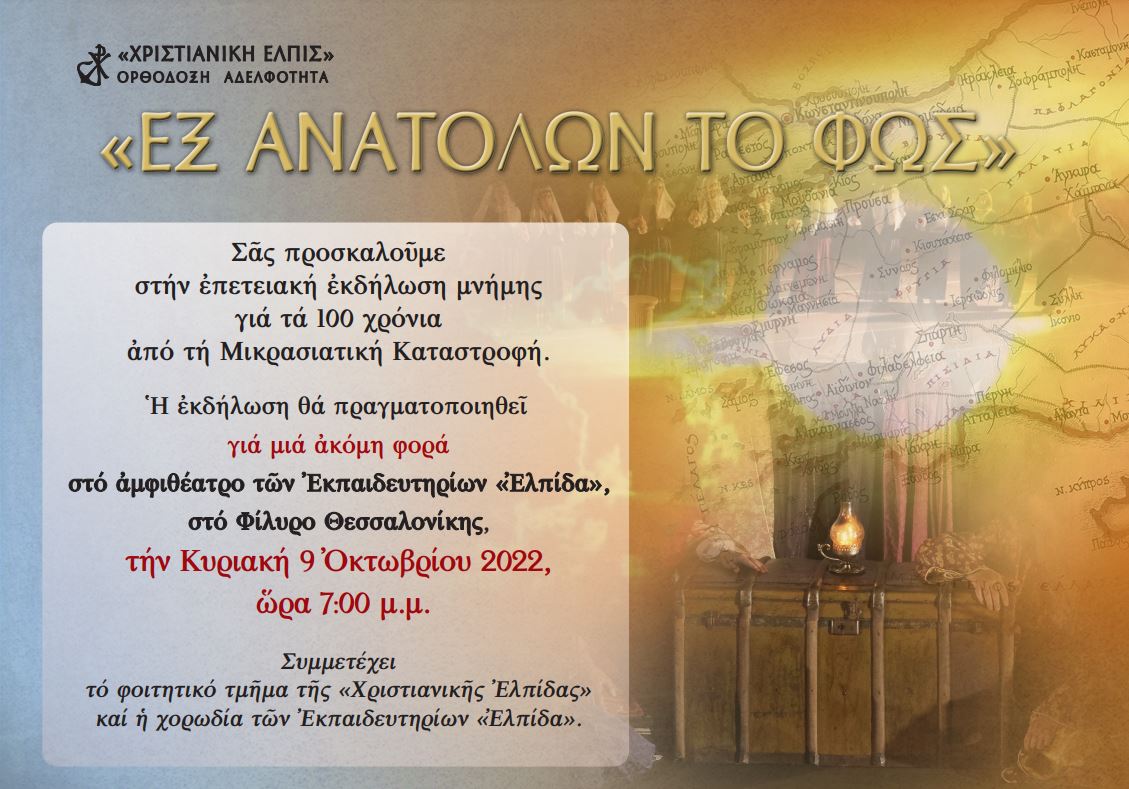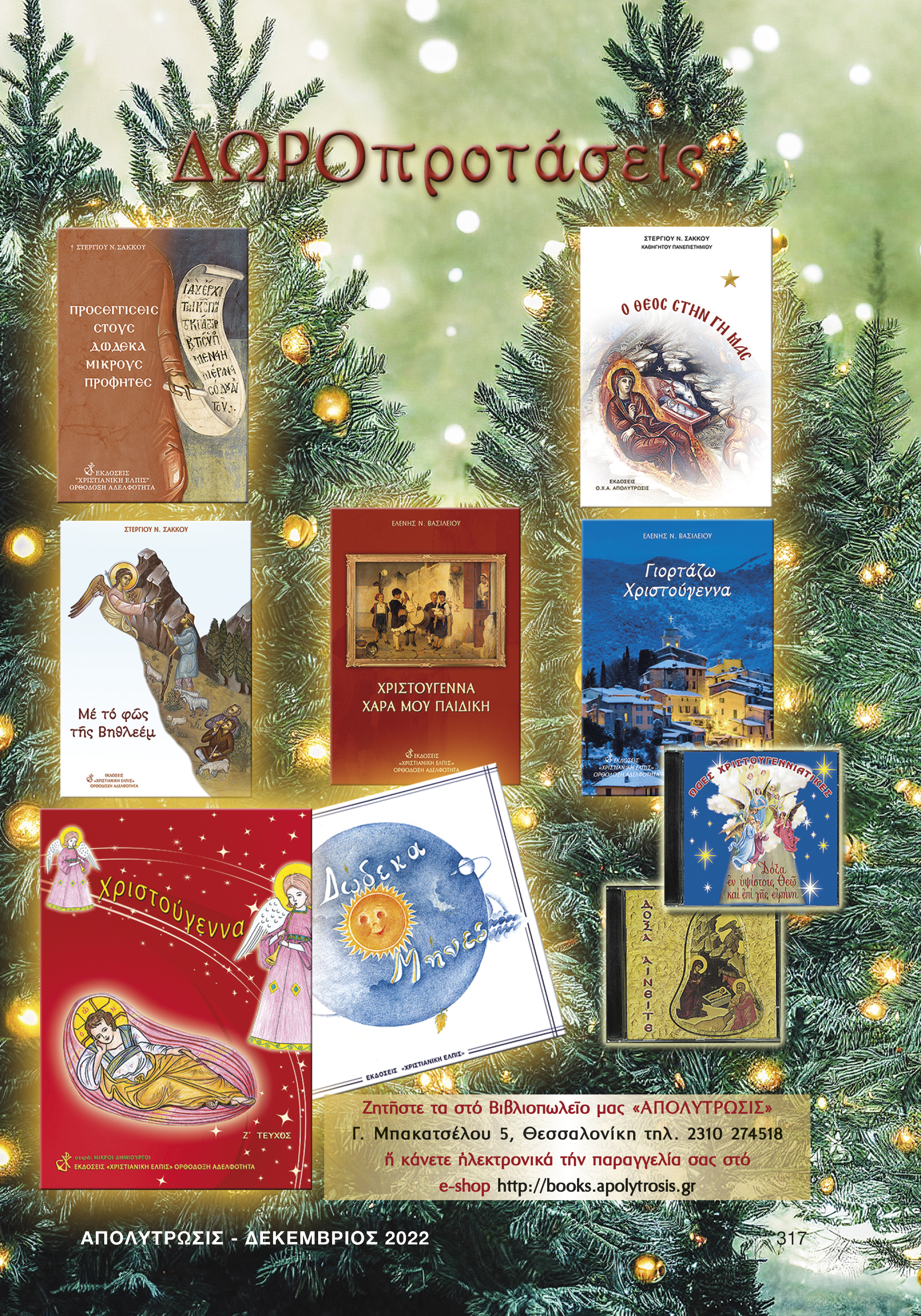 ΑΠΟΛΥΤΡΩΣΙΣ
ΧΡΙΣΤΙΑΝΙΚΗ ΟΡΘΟΔΟΞΗ ΑΔΕΛΦΟΤΗΣ
ΑΠΟΛΥΤΡΩΣΙΣ
ΧΡΙΣΤΙΑΝΙΚΗ ΟΡΘΟΔΟΞΗ ΑΔΕΛΦΟΤΗΣ
Super User
The Night Christ was Born
Translation from the Book
Ὁ Θεός στήν Καινή Διαθήκη, Βοήθημα Κατωτέρου Κατηχητικοῦ Β΄,
ἐκδ. «Χριστιανική Ἐλπίς» Ὀρθόδοξη Ἀδελφότητα, Θεσσαλονίκη 2015, σσ. 67-71
Everyone is looking forward to the upcoming Feast. We make preparations, we organize parties, we decorate houses, shops and streets. Christmas is one of the biggest feasts of our faith; it’s the “Mother of Feasts”.
But what do we really celebrate on Christmas? We celebrate the Nativity of our Lord and Savior, Jesus Christ; the fact that God came to Earth! He came to live among humans! He was born by Virgin Mary. He became a man, never ceasing to be God!
At that time, Caesar Octavian Augustus who was the emperor of the entire Roman Empire, issued a decree: A population census would be carried out. That is, all his subjects should be registered, so that he would know how many slaves he had under his power in order to tax them. The imperial order was strict. All were to obey it, without exception. Any indifference or delay would be punished.
Jews had to go to their hometown to get registered. Righteous Joseph and his betrothed Virgin Mary, who were from the royal line of David, set off from Nazareth of Galilee to Bethlehem of Judea, which was David’s city.
Upon arriving to Bethlehem, they couldn’t find any place to stay for the night, because of the great multitude. The travelers slept on the ground of large crowded inns, because there were not any private rooms at that time. Mary, however, was on the ninth month of her pregnancy, so she expected to give birth to her Son any time soon. It wasn’t possible for her to be squeezed among so many people.
There was usually a stable for the travelers’ animals near every inn, so Mary chose to spend the night in that place. There she gave birth to Christ. Our God humbled himself and accepted to be born in one of the filthiest places on earth! Holy Mary swaddled her newborn Child and put Him in the manger, the food place for animals, which was clean enough.
None of the travelers noticed the great event nor did they know who was born that night. The announcement was made to some humble pious shepherds by a God’s angel. While they were guarding their herds in the countryside, a bright divine light shone in the darkness. The shepherds got scared but they heard the angel’s voice: “Fear not! I bring you great joy, joy for all the people! For you is born this day in the city of David a Savior, which is Christ the Lord. Here is the sign; you will find an Infant swaddled in a manger.”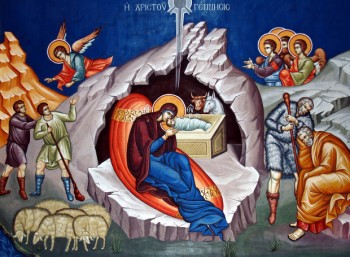 When the angel delivered his great message, an infinite number of angels appeared in the sky. They were singing and praising God with a wonderful hymn: “Glory to God in the highest, peace on earth, good will toward men”. The shepherds were watching the angels in astonishment, until they disappeared. Then they decided to go to Bethlehem and see for themselves what God had revealed to them. They rushed and found Holy Mary, Joseph and the divine Infant in the manger, exactly as the angel had told them. They devoutly kneeled before little Jesus.
When the angel delivered his great message, an infinite number of angels appeared in the sky. They were singing and praising God with a wonderful hymn: “Glory to God in the highest, peace on earth, good will toward men”. The shepherds were watching the angels in astonishment, until they disappeared. Then they decided to go to Bethlehem and see for themselves what God had revealed to them. They rushed and found Holy Mary, Joseph and the divine Infant in the manger, exactly as the angel had told them. They devoutly kneeled before little Jesus.
The real celebration
If only we had been in a small corner of that stable or among the shepherds that night! If only we could have listened to the angel’s message and have kneeled before newborn Christ!
But we can really find Christ, the world’s Savior, and worship Him. The Christ’s manger is in every Orthodox church waiting for us. The sound of the church bells will call us, like the angels called the shepherds; “Come, come and find the divine Infant in the church manger!”
Joy to those who go to the church! They listen to the angels’ hymn in the sweet chants. They can see Virgin Mary holding Christ and kiss the icon of the Nativity of Christ. People, who are prepared with the sacrament of Confession, can receive the Holy Communion and their heart can become Christ’s manger!
This is how Christians really celebrate Christmas and this celebration is by far the most joyful of any other festive event. Everyone should participate in the liturgy on Christmas Day. It’s the most precious gift we can ask from our family; to go all together to the church. The traditional Christmas liturgy starts early in the morning, before sun rises. In this way we can imitate the faithful shepherds who rushed in the middle of the night to worship the Savior of the world. Then, our heart will be full of joy and our lips will thankfully sing the angels’ hymn.
I wish you a Merry and Blessed Christmas!
Copyright © 2021 by Orthodox Christian Association «ΧΡΙΣΤΙΑΝΙΚΗ ΕΛΠΙΣ» ΟΡΘΟΔΟΞΗ ΑΔΕΛΦΟΤΗΤΑ. All rights reserved.
Faithful Ruth
Translation from the Book
Ὁ Θεός στήν Παλαιά Διαθήκη, Βοήθημα Κατωτέρου Κατηχητικοῦ Α΄,
ἐκδ. «Χριστιανική Ἐλπίς» Ὀρθόδοξη Ἀδελφότητα, Θεσσαλονίκη 2015, σσ. 80-84
How beautifully is everything decorated all around us these days! The roads, the houses, the shops… And while we enjoy all these in the Christmas spirit, each one of us is waiting for something. Something, or maybe Someone? Yes, the great Visitor, Jesus Christ. The King of the kings is going to be born once more on our earth. He is coming! The Old Testament, centuries before Christ’s birth, was trumpeting this great announcement. He is coming! The faithful and righteous people of the Old Testament were waiting for Him. This was their desire: if only Christ could be born from their own generation! Every year we honor Christ’s forefathers before Christmas. Among them there is a non-Israelite woman: Ruth.
Her story is being narrated in the eighth book of the Old Testament, which was named after her. She was a woman of true faith, alike with patriarch Abraham’s faith. She didn’t belong to Abraham’s descendants; she was a Moabite. The Moabites were descended from Lot, Abraham’s nephew. Unfortunately, they had abandoned real God and worshipped the idols. Ruth met real God through her mother-in-law, Naomi. Naomi had emigrated to the nearby country of Moab accompanied by her husband and her two sons, because of the starvation Palestine had been suffering from. But more tragedies were to come: After ten years she lost her husband and her two sons. She was left alone with her two Moabite daughters-in-law in a foreign country. She was looking forward to return to her hometown. She wanted to live with God’s chosen people. As soon as she was informed that things were improving back home and that there was food for everyone, she decided to return. But what about her young daughters-in-law? She advised them to return to their own mothers and remarry. She bid them farewell, kissed them affectionately and wished them God’s blessings. But for her surprise they didn’t want to leave her.
“We are coming with you”. They said.
“No, my daughters, what will you gain by staying with me, a miserable and sad woman? You should return to your homes”, she responded.
But she managed to persuade only the one daughter-in-law. Ruth had made her decision and wouldn’t change her mind. She wanted to follow Naomi. Not only to support her, but she wished to belong to God’s chosen people. Ruth didn’t believe to dead idols and neither wanted to live like her pagan fellowmen. Near Naomi she had met real God and she wanted to worship Him and live according to His commandments. When her sister-in-law left, Ruth said:
“I will not abandon you. I will go wherever you go and I will stay wherever you stay. Your people are my people and your God is my God”. In those words, one can detect the greatness of her faith! She believed that Naomi’ s God was the only real one and she was afraid of losing Him, if she left Naomi!
 Therefore, she came with her mother-in-law to Bethlehem in Judaea. At first, she faced severe hardships. She had to work really hard. She had to go to the fields- it was harvest time- to glean what the workers dropped from their bundles. This was quite a humiliating job that only very poor people used to do. She worked hard and restlessly all day long, in order to support both herself and her mother-in-law. She was eager to make any sacrifice for the real God.
Therefore, she came with her mother-in-law to Bethlehem in Judaea. At first, she faced severe hardships. She had to work really hard. She had to go to the fields- it was harvest time- to glean what the workers dropped from their bundles. This was quite a humiliating job that only very poor people used to do. She worked hard and restlessly all day long, in order to support both herself and her mother-in-law. She was eager to make any sacrifice for the real God.
Booz was the master of the fields she went to. He was impressed because Ruth was hard-working and modest. But most of all, he was impressed by her story and her true faith. She had left her country and her relatives and settled in an unknown land, only because she believed in those people’s God.
Therefore, he really appreciated Ruth and behaved to her with kindness from the very beginning. He ordered his workers to talk to her with politeness, help her and give her from their already made bundles. After a while, God blessed their marriage. Indeed, Booz chose Ruth for his wife, a poor Moabite woman, because of her true faith. For Booz this was her most precious wealth. He made the correct decision. Because of Ruth’s faith, God granted them with a special, admirable blessing: Christ came from their descendants! They gave birth to a graceful son, Obed, who became the father of Jesse and Jesse was David’s father. Holy Mary’s lineage was from David’s generation. Therefore, Ruth, David’s great grandmother, had the special honor that all the faithful Israelite women were longing for: Messiah, the savior of the world to be born from their own generation.
On Sunday before Christmas, we always hear during the Gospel reading, the names of Christ’s blessed forefathers. Among them, we also hear Ruth’s name who entered God’s people because of her great faith.
Christmas Gift
Even though Ruth had been raised believing in idols, when she met real God, she believed Him and loved Him with all of her heart. What if everyone else was bowing in front of fake gods? She didn’t have any doubt: He was the real God! And she was so happy she met him! That’s why she followed Naomi to Bethlehem. She longed to live among real God’s people. What if she should leave her own people and go away? There was only one thing she cared about: Not to lose the true God! And not only did she not lose Him, but she became His relative!
And all of us, children, if we have Ruth's faith and love, we will be God's relatives! That's why he came on earth as a God-man to make us His children (see Gal 4:4-7). This is the great gift of Christmas: Christ was born humbly in a stable. The shepherds worshipped a weak infant, so that we, the weak and sinful people, may become God’s children!
And this year, let us all worship in gratitude Christ who is being born. Let us worship Him with Ruth’s love and faith. Where shall we find Him? In the Church, in every Orthodox church. He is waiting for us to approach Him and with a pure heart to receive the Holy Communion. In this way we receive Him into our hearts and make our hearts His manger! May Jesus Christ be our God and may we worship Him as Ruth, in our whole life!
Copyright © 2021 by Orthodox Christian Association «ΧΡΙΣΤΙΑΝΙΚΗ ΕΛΠΙΣ» ΟΡΘΟΔΟΞΗ ΑΔΕΛΦΟΤΗΤΑ. All rights reserved.
Κυρ. Θ΄ Λουκᾶ Λκ 12,16-21 (Λειτουργικό κήρυγμα)
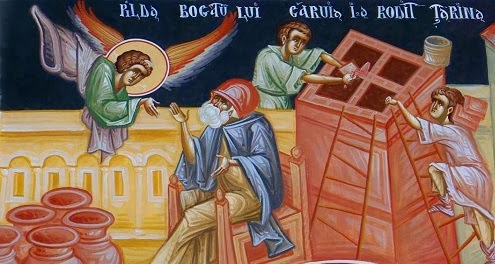 Ἡ φιλόστοργη μητέρα μας, ἡ Ἐκκλησία, ἰδιαίτερα αὐτή τήν περίοδο, πού μπαίνουμε πρός τόν χειμώνα, μέ τά ἀναγνώσματά της καλλιεργεῖ τήν ἀγάπη στίς καρδιές μας. Διδάσκει τήν ἐλεημοσύνη, τήν εὐσπλαγχνία καί τή φιλανθρωπία, πού εἶναι ἀναγκαῖα, γιά νά βοηθηθοῦν πονεμένοι ἄνθρωποι, ἀλλά καί ἀπαραίτητα γιά τή σωτηρία μας. Σήμερα στήν παραβολή πού ἀκούσαμε (Λκ 12,16-21) ὁ Κύριος ὀνομάζει ἕναν πλούσιο ἄφρονα, δηλαδή τρελό. Γιατί; Ἐμεῖς θά λέγαμε ὅτι εἶναι ἐπιτυχημένος καί εὐτυχισμένος ἄνθρωπος. Κι ὅμως ὁ Κύριος τόν ὀνομάζει τρελό. Οἱ ἅγιοι πατέρες μᾶς ἐξηγοῦν τούς λόγους.
Ἡ φιλόστοργη μητέρα μας, ἡ Ἐκκλησία, ἰδιαίτερα αὐτή τήν περίοδο, πού μπαίνουμε πρός τόν χειμώνα, μέ τά ἀναγνώσματά της καλλιεργεῖ τήν ἀγάπη στίς καρδιές μας. Διδάσκει τήν ἐλεημοσύνη, τήν εὐσπλαγχνία καί τή φιλανθρωπία, πού εἶναι ἀναγκαῖα, γιά νά βοηθηθοῦν πονεμένοι ἄνθρωποι, ἀλλά καί ἀπαραίτητα γιά τή σωτηρία μας. Σήμερα στήν παραβολή πού ἀκούσαμε (Λκ 12,16-21) ὁ Κύριος ὀνομάζει ἕναν πλούσιο ἄφρονα, δηλαδή τρελό. Γιατί; Ἐμεῖς θά λέγαμε ὅτι εἶναι ἐπιτυχημένος καί εὐτυχισμένος ἄνθρωπος. Κι ὅμως ὁ Κύριος τόν ὀνομάζει τρελό. Οἱ ἅγιοι πατέρες μᾶς ἐξηγοῦν τούς λόγους.
Πρῶτος λόγος. Ἡ γῆ του «εὐφόρησεν». Τόσο μεγάλη εἶναι ἡ εὐφορία τῶν κτημάτων του πού δέν ξέρει ποῦ νά συνάξει τούς καρπούς. Ὑποφέρει, χάνει τόν ὕπνο του καί σκέπτεται ποῦ θά ἀποθηκεύσει τόσα ἀγαθά. Κι ὅμως ὑπάρχουν πάρα πολλές ἀποθῆκες ἄδειες. Εἶναι τά στομάχια τῶν πτωχῶν, τά σώματα τῶν γυμνῶν, τά σπίτια τῶν ταλαιπώρων ἀνθρώπων. Καί μάλιστα πολλοί ἀπό αὐτούς ἴσως εἶναι ἄνθρωποι πού δουλεύουν καί φροντίζουν γιά τήν περιουσία του. Καί ἐνῶ δέν ἔχει ποῦ νά βάλει τή σοδειά του, τούς ἀδικεῖ μέ ἕνα ψευτομισθό.
Δεύτερος λόγος. Βγάζει ἀπόφαση: «καθελῶ μου τὰς ἀποθήκας καὶ μείζονας οἰκοδομήσω». Καί ἄν, πλούσιε, τήν ἄλλη χρονιά εἶναι ὑπερδιπλάσια ἡ εὐφορία, τί θά κάνεις; Θά γκρεμίσεις καί τίς καινούργιες ἀποθῆκες γιά νά κτίσεις ἀκόμα μεγαλύτερες; ῏Ω τρέλα!
Τρίτος λόγος. Δέν ὑπολογίζει τήν αἰωνιότητα. Εἶναι μεγάλο τό θέμα αὐτό, ἀδέλφια μου: Τί σχέση ἔχω μέ τήν αἰωνιότητα, μέ τήν ἀληθινή ζωή γιά τήν ὁποία μέ ἔπλασε καί μέ προόρισε ὁ Θεός; ῎Αν δέν μέ ἀπασχολεῖ αὐτό τό ὕψιστο δῶρο τοῦ Θεοῦ, μέ τό ὁποῖο μέ προίκισε, εἶμαι τρελός, μέ μεγάλο βαθμό τρέλας. Πρέπει νά λάβω τά μέτρα μου γιά νά θεραπευθῶ.
Τέταρτος λόγος. Δέν σκέφτεται ὅτι ὑπάρχει θάνατος. Λέγει στήν ψυχή του· «ψυχή, ἔχεις πολλὰ ἀγαθὰ κείμενα εἰς ἔτη πολλά· ἀναπαύου, φάγε, πίε, εὐφραίνου». Ὑπάρχει τίποτε βεβαιότερο τοῦ θανάτου; «Οὐδὲν τοῦ θανάτου βεβαιότερον καὶ οὐδὲν τῆς ὥρας τοῦ θανάτου ἀδηλότερον». Εἶναι ὑπερβέβαιον ὅτι θά πεθάνει καί μάλιστα χωρίς νά πάρει μαζί του τίποτε, παρά μόνον τά ἔργα του, εἴτε ἀγαθά εἴτε κακά. Καί γι᾽ αὐτά θά κριθεῖ· «Τοὺς γὰρ πάντας ἡμᾶς δεῖ φανερωθῆναι ἔμπροσθεν τοῦ βήματος τοῦ Χριστοῦ, ἵνα κομίσηται ἕκαστος... πρὸς ἃ ἔπραξεν εἴτε ἀγαθὸν εἴτε κακόν» (Β´ Κο 5,10). Ἕνας πού δέν σκέπτεται αὐτή τή βεβαία βεβαιότητα καί δέν τή λαμβάνει ὑπ᾽ ὄψιν του στά σχέδιά του, εἶναι ἄνθρωπος συνετός καί μυαλωμένος; Εἶναι τρελός. Εἶναι ἄφρων.
Πέμπτος λόγος. Τέλος, εἶναι τρελός, διότι δέν σκέπτεται ὅτι δέν εἶναι μόνος στόν κόσμο αὐτό.
Ἰδιαίτερα ὅμως θέλω νά μείνω σ᾽ αὐτό πού ἀκοῦμε νά λέγει ὁ ἴδιος: «ψυχή, ἔχεις πολλὰ ἀγαθὰ κείμενα εἰς ἔτη πολλά, φάγε, πίε, εὐφραίνου». Ἀκοῦτε τρέλα ἀνθρώπου; Μ᾿ αὐτά τρέφεται ἡ ψυχή, ταλαίπωρε; ῾Η ψυχή τρέφεται μέ ἀλήθειες, μέ ἰδέες, μέ τά λόγια τοῦ Θεοῦ, μέ τά μυστήρια τῆς σωτηρίας. Αὐτά εἶναι ἡ τροφή τῆς ψυχῆς. Ὁ Χριστός μας, ὅπως προσφέρει τά ἀγαθά γιά νά ζήσουμε σωματικά, ἔχει καί τόσα ἀγαθά γιά νά ζήσει ἡ ψυχή μας. Πίστη, ἀγάπη, ἐλπίδα, ἐλεημοσύνη, φιλανθρωπία, νά τά τρόφιμα, τά ἀγαθά μέ τά ὁποῖα μπορεῖ νά τραφεῖ ἡ ψυχή σου καί νά ζήσει, ὄχι ἔτη πολλά, ἀλλά ἔτη αἰώνια.
Οἱ πατέρες μας διδάσκουν ὅτι ὁ Θεός πού εἶναι οἰκτίρμων ἔπλασε καί τόν ἄνθρωπο σπλαγχνικό, φύτευσε μέσα στήν ὕπαρξή μας τή συμπάθεια. Γι᾽ αὐτό, ὅταν δέν φροντίζουμε νά χορτάσει ὁ συνάνθρωπός μας ὅπως χορταίνουμε ἐμεῖς, νά ντυθεῖ ὅπως ντυνόμαστε, δέν ἀγαποῦμε δηλαδή τόν πλησίον ὅπως τόν ἑαυτό μας, τότε ἔχουμε ὑποστεῖ ἐκτροπή τοῦ προορισμοῦ μας, μία μεγάλη διαστροφή στήν ὕπαρξή μας.
Λέγει ὁ ἅγιος Χρυσόστομος: Ὁ Κύριος θά σᾶς δικάσει καί θά σᾶς καταδικάσει, διότι αὐτά πού σπαταλᾶτε «πατρῷα ἐστι», εἶναι τοῦ πατέρα τῶν ὀρφανῶν, τῶν πεινασμένων. Ναί, σᾶς τά ἐμπιστεύθηκε ὁ Θεός πατέρας ὅπως ἕνας ἐμπιστεύεται τά χρήματα τοῦ κράτους στόν ταμία γιά νά τά δώσει σ᾿ αὐτούς πού τά δικαιοῦνται. Σᾶς τά ἐμπιστεύθηκε, πλούσιοι ἄφρονες, γιά νά τά διοχετεύσετε καί νά τά δώσετε στά παιδιά τοῦ Θεοῦ, τοῦ πατέρα πού σᾶς τά χορήγησε καί θά σᾶς ζητήσει κάποτε τόν λογαριασμό.
᾿Αδελφοί μου, δέν εἶναι ἄφρων μόνο ὁ πλούσιος τῆς παραβολῆς, εἴμαστε καί πολλοί ἀπό μᾶς ἄφρονες. Ἄν ἐξετάσουμε καλά τόν ἑαυτό μας καί βάλουμε τό χέρι στήν καρδιά, θά δοῦμε τί σπατάλες κάνουμε, τί περιττά ἀγοράζουμε! Σκεφθήκαμε ὅτι γιά ὅλα αὐτά θά κριθοῦμε; Νά τό σκεφθοῦμε ὅτι ἐγώ εἶμαι ὁ ἄφρων καί μιλάει γιά μένα ὁ Κύριος, καί νά πάρω σήμερα τήν ἀπόφαση νά πῶ τέρμα στίς σπατάλες, τέρμα στίς ἀγορές. Θά περιορισθῶ, θά ζήσω λιτά, οὕτως ὥστε νά βοηθήσω ὅσο μπορῶ. ῎Ετσι θά λύσω τό πρόβλημα τοῦ ἑαυτοῦ μου, νά μή χαρακτηρίζομαι τρελός, ἀλλά θά βοηθήσω καί τόν ἀδελφό μου πού ὑποφέρει. Μέ αὐτόν τόν τρόπο, ἀδέλφια μου, νά ἑτοιμαστῶ νά γιορτάσω τά Χριστούγεννα. Τόν Χριστό μας, Αὐτόν πού μέ τρέφει μέ τόν λόγο του καί τό αἷμα του, Αὐτόν πού ἑτοίμασε γιά μένα αἰώνια βασιλεία, τόν πτωχό Ἰησοῦ πού γεννήθηκε μέσα στόν στάβλο, νά τόν φιλοξενήσω στό σπίτι μου, νά τόν ντύσω, νά τόν θρέψω στό πρόσωπο τοῦ ἀδελφοῦ μου.
Στ. Ν. Σάκκος
Κυ 20-11-2005, ἱ. ν. Ἀναλήψεως τοῦ Σωτῆρος, Φίλυρο
ΚΑΤΗΧΗΤΙΚΑ ΒΟΗΘΗΜΑΤΑ
ΝΕΑ ΚΥΚΛΟΦΟΡΙΑ
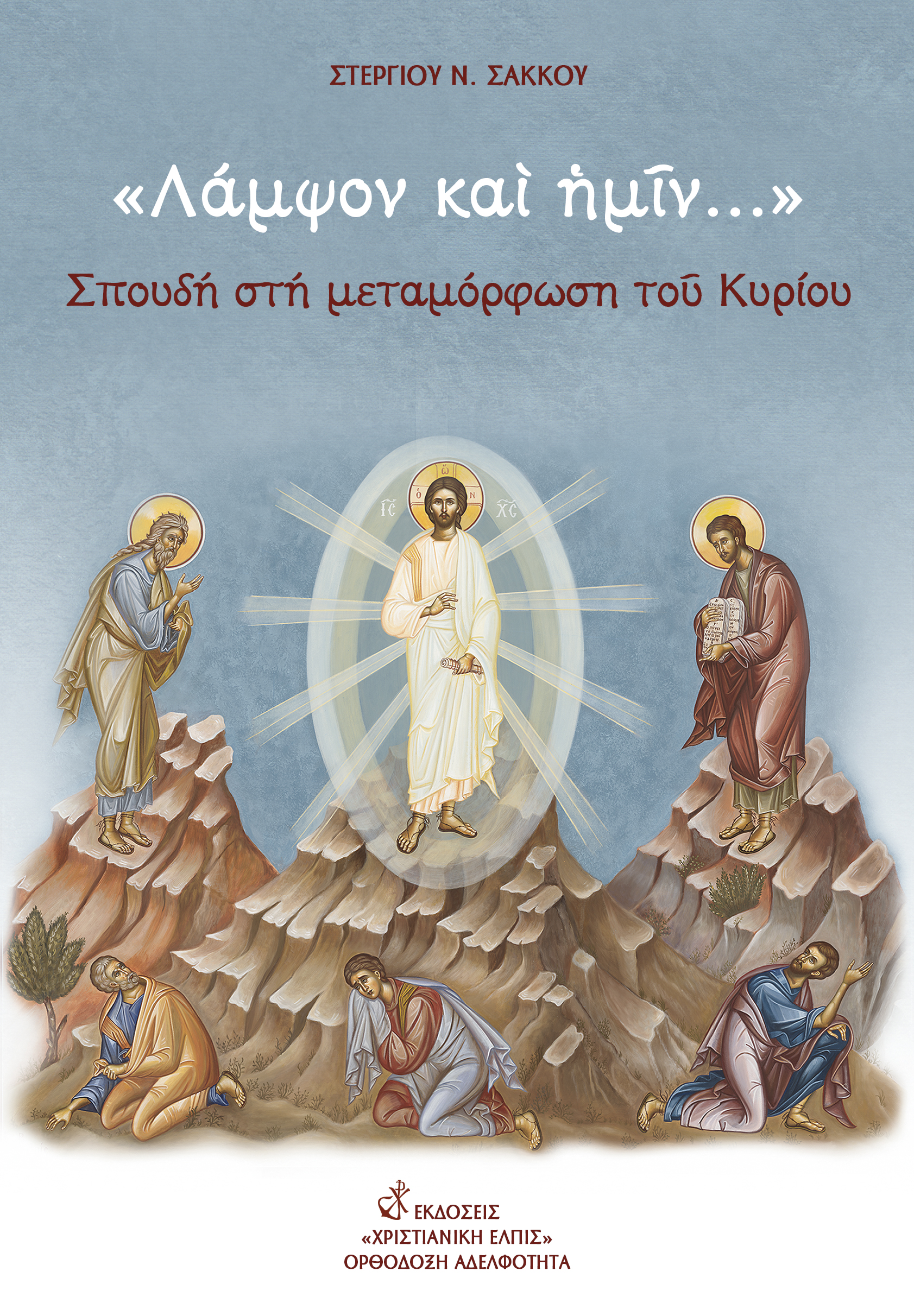
Ἡ θεολογία τῆς Μεταμορφώσεως εἶναι ἀνάγκη νά γίνει ἐντρύφημα, γλυκύτατο καί προσφιλέστατο μελέτημα ὅλων τῶν Ὀρθοδόξων, κτῆμα τοῦ πιστοῦ λαοῦ. Νά μπορεῖ κάθε ὀρθόδοξος χριστιανός νά πλησιάσει τόν μεταμορφωμένο Χριστό καί νά ἀπολαύσει τήν προσωπική του μεταμόρφωση. Καί δέν εἶναι τοῦτο δύσκολο...
Ζητῆστε το στό Βιβλιοπωλεῖο μας "Ἀπολύτρωσις", Γ. Μπακατσέλου 5, Θεσ/νίκη
τηλ. 2310 274518
Λειτουργικό κήρυγμα (Λκ 6,31-36)
Ἀγάπη καί ἁγιότητα
 Ἡ εὐαγγελική περικοπή πού ἀκούσαμε σήμερα (Λκ 6,31-36) καταλήγει σέ ἕνα πολύ σπουδαῖο παράγγελμα τοῦ Κυρίου, τό ὁποῖο ἔχει σχέση μέ τόν προορισμό μας, μέ τή σωτηρία μας. Θά ἤθελα νά παρακαλέσουμε τό Πνεῦμα τό ἅγιο νά μᾶς φωτίσει, ὥστε νά κατανοήσουμε αὐτά τά λόγια καί νά τά φυλάξουμε μέσα στή σκέψη μας καί στήν καρδιά μας γιά νά εἶναι τροφή, πνοή, φῶς τῆς ζωῆς μας.
Ἡ εὐαγγελική περικοπή πού ἀκούσαμε σήμερα (Λκ 6,31-36) καταλήγει σέ ἕνα πολύ σπουδαῖο παράγγελμα τοῦ Κυρίου, τό ὁποῖο ἔχει σχέση μέ τόν προορισμό μας, μέ τή σωτηρία μας. Θά ἤθελα νά παρακαλέσουμε τό Πνεῦμα τό ἅγιο νά μᾶς φωτίσει, ὥστε νά κατανοήσουμε αὐτά τά λόγια καί νά τά φυλάξουμε μέσα στή σκέψη μας καί στήν καρδιά μας γιά νά εἶναι τροφή, πνοή, φῶς τῆς ζωῆς μας.
Λέγει, λοιπόν, ὁ λόγος τοῦ Κυρίου· Γίνεσθε οὖν οἰκτίρμονες, καθὼς καὶ ὁ πατὴρ ὑμῶν οἰκτίρμων ἐστί. ῾Ο λόγος αὐτός συγγενεύει μέ τόν λόγο «῎Εσεσθε οὖν ὑμεῖς τέλειοι, ὥσπερ ὁ πατὴρ ὑμῶν ὁ ἐν τοῖς οὐρανοῖς τέλειός ἐστί» (Μθ 5,48). Καί ἔχει τό ἴδιο νόημα μέ τό «ἅγιοι γίνεσθε, ὅτι ἐγὼ ἅγιός εἰμι» (Α´ Πέ 1,16). Τά λόγια αὐτά τοῦ Θεοῦ μας, τοῦ Κυρίου μας ᾿Ιησοῦ Χριστοῦ, ἐπισημαίνουν τόν προορισμό μας. Δείχνουν τόν στόχο μας, τό τέρμα τῆς ζωῆς μας, τῶν προσπαθειῶν μας καί τῶν ἀγώνων μας σ᾿ αὐτή τή ζωή, σ᾿ αὐτόν τόν κόσμο. Καί ὅμως τί κρίμα, τί ἀδικία γιά τόν ἑαυτό μας, νά μελετοῦμε τόσα καί τόσα ἄλλα δευτερεύοντα, τριτεύοντα, ἀσήμαντα πράγματα καί πολλά ὀλέθρια καί καταστρεπτικά καί νά μήν εἶναι τό πρῶτο μέλημά μας καί τό πρῶτο θέμα μας τό θέμα αὐτό· ποιός εἶναι ὁ προορισμός μου, γιατί ὑπάρχω στή ζωή αὐτή;
Σ᾿ αὐτό τό ἐρώτημα ἀπαντάει ὁ Κύριός μας, ἀπαντάει τό Πνεῦμα τό ἅγιο μέ τά τρία αὐτά χωρία τά ὁποῖα ἀνέφερα. Τό ἕνα λέγει· «ἅγιοι γίνεσθε, ὅτι ἐγὼ ἅγιός εἰμι». Νά γίνουμε ἅγιοι, ὅπως καί ὁ Θεός εἶναι ἅγιος. Μά τί εἶναι αὐτό πού ἀκούω; Νά γίνω ἐγώ ἅγιος σάν τόν ἅγιο Κυριακό, πού γιορτάζει σήμερα, τόν ἅγιο Γρηγόριο τόν φωτιστή τῆς μεγάλης Ἀρμενίας, πού γιορτάζει αὔριο; Πῶς εἶναι δυνατόν; Εἶναι εὔκολο τό πράγμα αὐτό; Πολύ εὔκολο! Μπορεῖ νά βάλω στή σκέψη μου νά γίνω κάτι καί νά μή γίνω. Οἱ νέοι μας, οἱ νέοι πού μέ ἀκοῦν, μπορεῖ νά σκέπτονται νά γίνουν κάτι, ἀλλά νά μήν τό κατορθώσουν. Γιατί; Γιατί τό νά γίνουν αὐτό πού θέλουν δέν ἐξαρτᾶται μόνο ἀπό τήν ἐπιθυμία τους. Πρέπει νά ὑπάρχουν καί οἱ προϋποθέσεις. Ἀλλά γιά νά γίνω ἅγιος, φθάνει νά τό θέλω, καί μπορῶ. Γιατί; Διότι τό θέλει ὁ Θεός. Τό νά γίνω ἅγιος ἐξαρτᾶται ἀπό δυό παράγοντες: ἀπό τόν ἑαυτό μου καί ἀπό τόν Θεό. Ὁ Θεός τό θέλει, τό προστάζει καί μάλιστα μᾶς ἔδωσε τίς δυνατότητες. Μᾶς ἔδωσε τό κατ᾿ εἰκόνα, πού ἄν τό καλλιεργήσουμε φθάνουμε στό καθ᾿ ὁμοίωσιν. Μᾶς ἔδωσε πρότυπο τόν ἴδιο τόν Χριστό. Ὁ Θεός ἔγινε ἄνθρωπος καί συνέδεσε τή ζωή του μέ τή ζωή μας, τήν ἱστορία του μέ τήν ἱστορία μας γιά νά μᾶς βοηθήσει νά συνδέσουμε κι ἐμεῖς τή ζωή μας μέ τή ζωή του καί τήν ἱστορία μας μέ τήν ἱστορία του. Νά πῶς μποροῦμε νά γίνουμε ἅγιοι. Ἅγιος εἶναι ὁ ἄνθρωπος τοῦ Θεοῦ.
Ἀκόμη λέγει· «῎Εσεσθε οὖν ὑμεῖς τέλειοι, ὥσπερ ὁ πατὴρ ὑμῶν ὁ ἐν τοῖς οὐρανοῖς τέλειός ἐστι». Τέλειος, δηλαδή νά μή μοῦ λείπει τίποτε, νά μήν ἔχω ἐπικίνδυνα καί ξένα στοιχεῖα στόν ἑαυτό μου, νά ἔχω θεῖα πράγματα. Κι ἐδῶ εἶναι πού μπερδευόμαστε, κι ἐδῶ εἶναι πού μπλοκάρουμε καί ἀνατρεπόμαστε καί παθαίνουμε τή μεγάλη καταστροφή. Διώχνουμε τά θεϊκά στοιχεῖα ἀπό τή σκέψη καί τήν καρδιά μας καί μπαίνει μέσα μας ὁ κόσμος καί ὅλα τά κοσμικά. Μπερδευόμαστε, ζαλιζόμαστε, θολώνει ἡ σκέψη, ἀναστατώνεται ἡ καρδιά μας καί καταστρεφόμαστε πέρα γιά πέρα.
Τό νά γίνω ἅγιος, ἴσως δέν τό καταλαβαίνουμε. Τό νά γίνω τέλειος, ἴσως μᾶς φαίνεται ἀκατόρθωτο. Τό τελευταῖο ὅμως πού ἀκούσαμε σήμερα εἶναι πολύ πρακτικό καί πολύ κατανοητό· «γίνεσθε οὖν οἰκτίρμονες, καθὼς καὶ ὁ πατὴρ ὑμῶν οἰκτίρμων ἐστί», πού σημαίνει νά εἴμαστε σπλαγχνικοί, νά ἔχουμε ἀγάπη. Νά τό πρῶτο σκαλί στόν ἀγώνα μας καί στήν προσπάθειά μας: ἡ ἀγάπη. Καλλιεργώντας μέ τήν ἀγάπη τόν ἑαυτό μας, καλλιεργοῦμε καί τήν ἁγιότητα καί τήν τελειότητα.
Ἀδέλφια μου, ὁ ἄνθρωπος ζῆ γιά νά ἐπιτύχει τήν ἁγιοσύνη του, τήν τελειότητά του, τήν οἰκτιρμοσύνη. Αὐτός εἶναι ὁ προορισμός μας. ῞Ολα τά ἄλλα πού κάνουμε στόν κόσμο αὐτό -σπουδές, προσπάθειες, ἐπιχειρήσεις- εἶναι ἀναγκαῖα βέβαια γιά τή ζωή μας, νά ἐξοικονομήσουμε τά πρός τό ζῆν, καί τά εὐλογεῖ ὁ Θεός καί μέ τή βοήθεια τοῦ Θεοῦ μποροῦμε νά τά πραγματοποιήσουμε. Ἀλλά ὅλα αὐτά δέν ἔχουν κανένα νόημα καί εἶναι ἐπικίνδυνα γιά τή σωτηρία μας, ἄν δέν βάλουμε μπροστά μας τόν πρῶτο καί κύριο στόχο τῆς ζωῆς μας, αὐτόν πού ταυτίζεται μέ τόν προορισμό μας. Ὁ Κύριος μᾶς ἔδωσε ὅλες τίς προϋποθέσεις. Λέγει ὁ ἀπόστολος Παῦλος ὅτι μᾶς ἔδωσε τόν «ἀρραβῶνα τοῦ Πνεύματος» (Β´ Κο 1,22). Εἶναι τό χρίσμα πού πήραμε. Τί μεγάλη δύναμη, τί σπουδαία προϋπόθεση! Μποροῦμε, λοιπόν, ἐκμεταλλευόμενοι τόν ἀρραβώνα τοῦ Πνεύματος, τό χρίσμα, ὅλες τίς εὐλογίες, πού μᾶς ἔδωσε ὁ Θεός, νά γίνουμε σπλαγχνικοί, νά γίνουμε οἰκτίρμονες, νά γίνουμε τέλειοι καί ἅγιοι, νά ἐκπληρώσουμε τόν προορισμό μας καί νά φθάσουμε ἐκεῖ πού μᾶς ἔταξε ὁ Θεός, πού μᾶς θέλει ὁ Θεός, πού μᾶς περιμένει ὁ Θεός: στήν ἔνδοξη καί εὐλογημένη βασιλεία του. Ἀμήν.
Στ. Ν. Σάκκος
Κυριακή 29-9-2002, Φίλυρο
Λειτουργικό κήρυγμα (Λκ 5,1-11)
Σήμερα, πού εἶναι ἡ πρώτη Κυριακή τοῦ Λουκᾶ, μᾶς θυμίζει ἡ Ἐκκλησία μας πῶς κάλεσε ὁ Κύριος τούς τέσσερις πρώτους μαθητές του, Ἀνδρέα καί Πέτρο, Ἰωάννη καί Ἰάκωβο. Μελετώντας καί τά τέσσερα Εὐαγγέλια διαπιστώνουμε κάτι πολύ βασικό, ὅτι στίς σχέσεις τοῦ Ἰησοῦ μέ τούς μαθητές του διακρίνονται οἱ ἑξῆς βαθμίδες: γνωριμία κλήση ἐκλογή ἀποστολή.
Ὁ Κύριος πρίν καλέσει τούς μαθητές του, εἶχε μιά γνωριμία μαζί τους. Μετά ἀπό τή Βάπτιση καί τούς πειρασμούς, ἐκεῖ στόν Ἰορδάνη, γνώρισε, ἀνάμεσα στούς μαθητές τοῦ Προδρόμου, τόν Ἀνδρέα τόν πρωτόκλητο, τόν Ἰάκωβο, τόν Ἰωάννη καί κατόπιν τόν Πέτρο. Αὐτή εἶναι ἡ πρώτη γνωριμία, ἡ ὁποία στή συνέχεια ἔπαιξε βασικό ρόλο στήν ἱστορία τῶν μαθητῶν.
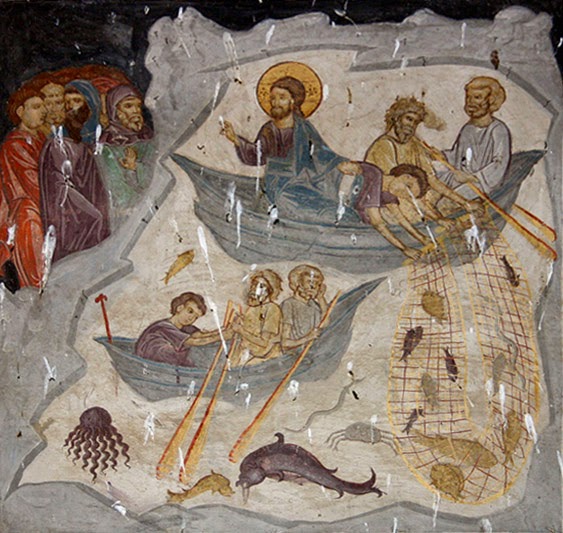 Μετά ἀπό τή γνωριμία ἔχουμε τήν κλήση, ἡ ὁποία ἀναφέρεται στά τρία πρῶτα Εὐαγγέλια ἀλλά μέ μία διαφορά. Στό κατά Ματθαῖον καί στό κατά Μᾶρκον λέγεται μόνο ὅτι ὁ Κύριος τούς συνάντησε στή λίμνη καί τούς κάλεσε νά τόν ἀκολουθήσουν, χωρίς νά ἀναφέρεται ἡ θαυμαστή ἁλιεία. ῾Ο Λουκᾶς ὅμως, βλέπει πολύ ἀπαραίτητο τό στοιχεῖο αὐτό τῆς θαυμαστῆς ἁλιείας καί δέν τό ἀποσιωπᾶ. Ὁ Κύριος κάλεσε τούς πρώτους μαθητές του μετά ἀπό ἕνα καταπληκτικό γεγονός: Παρακάλεσε τόν Πέτρο καί ἔσυρε τό πλοιάριό του λίγο πιό μέσα στή λίμνη. Ἀνέβηκε ἐκεῖ, γιά νά προστατευθεῖ ἀπό τό πλῆθος πού κόντευε νά τόν ρήξει στή θάλασσα. Τό ἔκανε ἄμβωνα καί κήρυξε στόν λαό. Μόλις τέλειωσε θέλησε νά πληρώσει τό ἐνοίκιο στόν Πέτρο καί στούς συνεταίρους του. Γι’ αὐτό τούς εἶπε: «Πηγαίνετε νά ψαρέψετε». «Μά, Κύριε», τοῦ ἀπαντοῦν, «κοπιάσαντες δι᾿ ὅλης τῆς νυκτὸς ἐλάβομεν οὐδέν», δέν πιάσαμε τίποτα. Αὐτοί ἦταν ἐπαγγελματίες ψαράδες, ὁ Χριστός -ὡς ἄνθρωπος βέβαιαδέν μποροῦσε νά ξέρει ἀπό θάλασσα, διότι ἦταν τέκτων, τεχνίτης, μαραγκός. Ἦταν ψαράδες, παράλογο γιά ὥρα πρωινή νά πᾶνε νά ψαρέψουν. Ὅμως ὁ Πέτρος συμπληρώνει: «᾿Επὶ δὲ τῷ ρήματί σου χαλάσω τὸ δίκτυον», ἐπειδή τό λές, θά ρίξω τά δίχτυα». Δέν εἶπε ὁ ἔμπειρος ψαράς «μά ἐγώ εἶμαι ψαράς, ξέρω σπιθαμή σπιθαμή τή λίμνη, ἐσύ πού δέν ξέρεις θά μοῦ πεῖς νά ψαρέψω τέτοια ὥρα;», ἀλλά λέει: «Ἀφοῦ ἐσύ τό λές θά τό κάνω». Καί γέμισαν τά δίχτυα τόσο, πού κινδύνευαν νά σχισθοῦν καί ζήτησε τή βοήθεια τῶν συνεταίρων, τῶν ἀδελφῶν Ἰωάννη καί Ἰακώβου.
Μετά ἀπό τή γνωριμία ἔχουμε τήν κλήση, ἡ ὁποία ἀναφέρεται στά τρία πρῶτα Εὐαγγέλια ἀλλά μέ μία διαφορά. Στό κατά Ματθαῖον καί στό κατά Μᾶρκον λέγεται μόνο ὅτι ὁ Κύριος τούς συνάντησε στή λίμνη καί τούς κάλεσε νά τόν ἀκολουθήσουν, χωρίς νά ἀναφέρεται ἡ θαυμαστή ἁλιεία. ῾Ο Λουκᾶς ὅμως, βλέπει πολύ ἀπαραίτητο τό στοιχεῖο αὐτό τῆς θαυμαστῆς ἁλιείας καί δέν τό ἀποσιωπᾶ. Ὁ Κύριος κάλεσε τούς πρώτους μαθητές του μετά ἀπό ἕνα καταπληκτικό γεγονός: Παρακάλεσε τόν Πέτρο καί ἔσυρε τό πλοιάριό του λίγο πιό μέσα στή λίμνη. Ἀνέβηκε ἐκεῖ, γιά νά προστατευθεῖ ἀπό τό πλῆθος πού κόντευε νά τόν ρήξει στή θάλασσα. Τό ἔκανε ἄμβωνα καί κήρυξε στόν λαό. Μόλις τέλειωσε θέλησε νά πληρώσει τό ἐνοίκιο στόν Πέτρο καί στούς συνεταίρους του. Γι’ αὐτό τούς εἶπε: «Πηγαίνετε νά ψαρέψετε». «Μά, Κύριε», τοῦ ἀπαντοῦν, «κοπιάσαντες δι᾿ ὅλης τῆς νυκτὸς ἐλάβομεν οὐδέν», δέν πιάσαμε τίποτα. Αὐτοί ἦταν ἐπαγγελματίες ψαράδες, ὁ Χριστός -ὡς ἄνθρωπος βέβαιαδέν μποροῦσε νά ξέρει ἀπό θάλασσα, διότι ἦταν τέκτων, τεχνίτης, μαραγκός. Ἦταν ψαράδες, παράλογο γιά ὥρα πρωινή νά πᾶνε νά ψαρέψουν. Ὅμως ὁ Πέτρος συμπληρώνει: «᾿Επὶ δὲ τῷ ρήματί σου χαλάσω τὸ δίκτυον», ἐπειδή τό λές, θά ρίξω τά δίχτυα». Δέν εἶπε ὁ ἔμπειρος ψαράς «μά ἐγώ εἶμαι ψαράς, ξέρω σπιθαμή σπιθαμή τή λίμνη, ἐσύ πού δέν ξέρεις θά μοῦ πεῖς νά ψαρέψω τέτοια ὥρα;», ἀλλά λέει: «Ἀφοῦ ἐσύ τό λές θά τό κάνω». Καί γέμισαν τά δίχτυα τόσο, πού κινδύνευαν νά σχισθοῦν καί ζήτησε τή βοήθεια τῶν συνεταίρων, τῶν ἀδελφῶν Ἰωάννη καί Ἰακώβου.
Πολύ σπουδαῖο μήνυμα μᾶς διδάσκει αὐτό τό ἱστορικό σημεῖο· ὅτι οἱ ἄνθρωποι μόνοι τους μπορεῖ νά κοπιάσουν μέρες καί νύχτες στή ζωή τους καί νά μήν κατορθώσουν τίποτε. Ἐνῶ μέ τήν ὑπακοή στόν Κύριο ἔχουν τήν εὐλογία του, καί τά ἀδύνατα γίνονται δυνατά. Μέ τόν Χριστό, καί ἄν ἀκόμα ἡ λογική δέν τό κατανοεῖ, τά ἀποτελέσματα εἶναι θαυμαστά. Θά τό πεῖ ὁ Κύριος ἀργότερα στούς μαθητές του· «χωρὶς ἐμοῦ οὐ δύνασθε ποιεῖν οὐδέν» (Ἰω 15,5).
Καί ἡ συνέχεια πολύ ἀποκαλυπτική, ὅπως τήν γράφει ὁ ἱστορικός Λουκᾶς. Ὁ Πέτρος πέφτει στά πόδια τοῦ Κυρίου καί τοῦ λέγει: «Φύγε ἀπό τή βάρκα μου, διότι εἶμαι ἁμαρτωλός». Ἀλλά ὁ Κύριος τόν ἐνθαρρύνει: «Μὴ φοβοῦ· ἀπὸ τοῦ νῦν ἀνθρώπους ἔσῃ ζωγρῶν». Θυμίζει ὁ Πέτρος τούς μεγάλους προφῆτες, τόν Μωυσῆ, τόν Ἠσαΐα, τόν Ἰεζεκιήλ, πού ὅταν τούς καλοῦσε ὁ Κύριος πρόβαλλαν τήν ἁμαρτωλότητα καί τήν ἀκαταλληλότητά τους. Καί ὁ Πέτρος καί οἱ ἄλλοι μαθητές, πού καλοῦνται στή μεγάλη ἀποστολή, τό πρῶτο πού νιώθουν εἶναι ἡ ἁμαρτωλότητά τους, ἡ ἀδυναμία τους. Ἔτσι πρέπει νά νιώθει κάθε πιστός, ὅταν τοῦ ἀναθέτει ὁ Κύριος μία ἀποστολή μέσα στό ἔργο του, ὅτι ὄχι μόνο εἶναι ἀδύναμος καί ἀκατάλληλος ἀλλά καί γεμάτος ἁμαρτίες.
Προσέξτε καί μιά λεπτομέρεια, ἀδέλφια μου, πολύ διδακτική. Μετά ἀπό τό θαυμαστό σημεῖο, οἱ ψαράδες τῆς Γαλιλαίας δέν χάρηκαν τήν πλούσια ψαριά. Δέν ἔτρεξαν νά τήν ἐκμεταλλευτοῦν. Ἡ μεγάλη χαρά τους δέν ἦταν ἡ ψαριά, ἦταν πού τούς κάλεσε ὁ Κύριος νά εἶναι κοντά του γιά πάντα. ῎Ετσι λοιπόν ἀφήνουν καί τά δίχτυα, ἀφήνουν καί τά καράβια καί τούς γονεῖς τους, ἀφήνουν καί τήν ψαριά -ἄλλοι ἄς τή χαροῦν καί ἄς τήν ἀπολαύσουνκαί ἀκολουθοῦν τόν Ἰησοῦ.
Στ. Ν. Σάκκος
Κυριακή 23-9-2001, Ἱ. Ν. Ἀναλήψεως,
Φίλυρο Θεσ/νίκης
TWELVE-YEAR-OLD JESUS AT THE TEMPLE
Translation from the Book
Ὁ Θεός στήν Καινή Διαθήκη, Βοήθημα Κατωτέρου Κατηχητικοῦ Β΄,
ἐκδ. «Χριστιανική Ἐλπίς» Ὀρθόδοξη Ἀδελφότητα, Θεσσαλονίκη 2015, σσ. 7-12
Twelve-year-old Jesus at the Temple
Lk 2:41-52
The only incident we know of Jesus’ childhood is His visit to the Temple in Jerusalem as a twelve-year-old boy. That’s why it’s so interesting to study it.
Passover (meaning Easter) was the most important Hebrew feast, because they remembered and celebrated how their ancestors crossed the Red Sea and were freed from the slavery of Egypt. When the time of Passover was near, pious Jews from all over Palestine were happily preparing for their usual pilgrimage. They were travelling to Jerusalem, the sacred city, in order to worship God all together in their one and only temple, the Temple of Solomon.
Travelling wasn’t easy at that time. It was tiring and dangerous. The travelers had to walk for days and few were lucky enough to have an animal to ride. There was always the fear of being attacked by thieves who would set traps on isolated paths. For that reason, people used to travel in groups, forming caravans, which was a safer and more pleasant way to travel.
Holy Mary, twelve-year-old Jesus and Joseph, their protector, were travelling with a caravan, among relatives and friends, from Nazareth to Jerusalem. It was a three-day walking distance at least, but nobody minded the trouble. They were happy because the Temple was their destination. While walking, they were singing the Psalms, praising God.
They stayed in Jerusalem for seven days. When the celebration of Passover was finished, the caravan set off to return to Nazareth. After walking throughout the day, they stopped to camp for night. That’s when the Holy Mother and Joseph realized that little Jesus was missing! The women had been walking on the front of the caravan and the men behind them. Joseph thought that Jesus was with His mother and Holy Mary thought that Jesus was walking along with Joseph. They were so worried when they couldn’t find him anywhere! At sunrise they went back to Jerusalem.
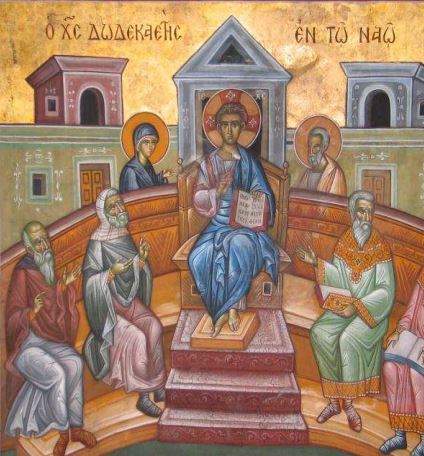
Jesus himself revealed His identity when His mother asked Him: “Son, why have you treated us like this? Your father and I have been anxiously searching for you.” Then Jesus revealed the truth: He wasn’t Joseph’s son, as everybody thought, but the son of God! “Why were you searching for me?” he asked. “Didn’t you know I had to be in my Father’s house?” God is His Father! Only Holy Mary and Joseph knew this secret. Was it the time for everyone to know? No, it was still early for this. The others couldn’t understand the meaning of Jesus’ words. They couldn’t but admire the twelve-year-old boy and His extraordinary wisdom. After all, He stood up and followed – obedient as always – Holy Mary and Joseph. It wasn’t the time for His public ministry yet.
Later, in His thirties, Christ started preaching and making miracles. His divine power and wisdom became more evident. He wasn’t only a human but God, the son of God who became human too. He is the God-Man!
It would be nice to have Jesus Christ among us, even for a while! We could ask Him questions; He could explain so many things to us and reveal divine secrets!
We can invite Jesus to be among us at Sunday’s school. He isn’t just a wise man of the past, He is the God-Man. He isn’t restrained by the flow of time. He can sit among us today just as He sat among the teachers of the law. He said “Wherever two or three of you gather in my name, I am among them” (Mt 18:20). Every gathering at Sunday’s school is a meeting with Christ!
We can listen to Him today just as the teachers did back then. In fact, He has left us His wise words written in His book, the Holy Bible! Every page is full of divine wisdom. Every word is inspired by God!
The lessons in Sunday’s school are taken from the texts of the Holy Bible. The Gospels narrate Christ’s life and teaching. Those, who won’t miss a single gathering, will be the happiest of all! Those, who listen carefully to the sacred words of the Bible, will be blessed by God! If the words are studied carefully, they are engraved on the heart and the person is filled with God’s wisdom.
A person that has God’s wisdom:
• Is enlightened and thinks accordingly.
• Makes the right decisions.
• Stands out because of his/her way of speaking and acting.
Here are two incidents of children who had God’s wisdom:
a. Catherine is at Grade 5 of primary school. Her classmates messed up. They caused the blackboard to fall and as a result both the teacher’s chair and the bookcase got damaged. The students decided to pretend they didn’t know anything but Catherine insisted on telling the truth paying for the damage with the money from the class’s money box. The students agreed and in the end the teacher praised their honesty instead of scolding them.
b. Paul is a sixth-grader. The two classes of his grade had been fighting for a long time. The reason was their playtime, as each class blamed the other for cheating. Whenever they talked, they mostly offended each other. Paul couldn’t stand this situation. He suggested making a huge card decorated with drawings and stickers. He wrote “We don’t want to fight! Let’s be friends forever! We are sorry!”. His classmates followed his plan and now the two classes are inseparable.
May all the students have a fruitful school year and gain God’s wisdom, so that their parents and teachers will be proud of them.
I ask for God’s wisdom
To study, to go to school,
to live with God my leader!
Copyright © 2021 by Orthodox Christian Association «ΧΡΙΣΤΙΑΝΙΚΗ ΕΛΠΙΣ» ΟΡΘΟΔΟΞΗ ΑΔΕΛΦΟΤΗΤΑ. All rights reserved.
THE FLOOD
Translation from the Book
Ὁ Θεός στήν Παλαιά Διαθήκη, Βοήθημα Κατωτέρου Κατηχητικοῦ Α΄,
ἐκδ. «Χριστιανική Ἐλπίς» Ὀρθόδοξη Ἀδελφότητα, Θεσσαλονίκη 2015, σσ. 25-29
Genesis 4:25-26; 6:1-9:17
The rainbow is a fascinating sight! As soon as it makes its appearance in the sky, we rush to see and admire it. Do you know that it is actually connected with a historical event we can be find in the Holy Bible?
Many years ago, there were only two families that lived on earth: the descendants of Cain, the “Cainites”, who were wicked and evil, like their ancestor, and the descendants of Seth. Seth was the first child that God gave Adam and Eve after Abel’s death. He was pious and kind like Abel. His descendants, the “Sethites”, were virtuous people devoted to God, too.
As time passed, however, since the “Sethites” begun to marry women out of Cain’s lineage, unfortunately, everyone drifted toward evil. There was only one family that stood out, because they retained their faith and love to God. This was Noah’s family.
One day, God called upon Noah and told him:
- The earth is filled with people’s sins. The time has come for me to destroy them, all living creatures and plants. You, however, will make an ark, an enormous ship. You will build it to have three floors and be separated in compartments. Cover it inside and outside with pitch. Then enter the ark with your sons – Noah had three sons: Ham, Shem, and Japheth – your wife and your sons’ wives. Take, two of every kind, a male and a female of birds, animals and every creeping creature. Store plenty of food for yourselves and for them.
Noah immediately begun building the ark with eagerness. But, while he was obeying to God’s will, the rest of mankind continued doing works of evil without any regret. They would even mock Noah but he pretended not to listen. The only thing that mattered to him was this: To do what God had ordered. He was building the ark for one hundred and twenty years and continued advising people to repent their ways. Their hearts, however, had been hardened and they paid no attention to his words. They kept becoming worse day by day.
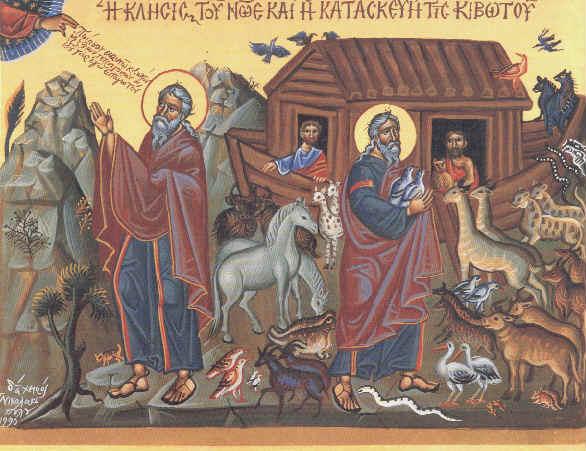 When the ark was finally ready, God informed Noah: “In seven days, the earth will flood. It will be raining for forty days and forty nights”. And so it happened! Right after Noah entered the ark along with his family and all of the animals, exactly as God had asked him to, the terrible flood begun. The waterfalls of the sky opened up! For forty days and forty nights, the rain continued to fall relentlessly. Water covered the surface of the earth, even the tallest of mountains. Everything drowned, people and animals! No living creature survived that dreadful downpour. No living creature, except for those eight people – Noah’s family – along with the animals they had gathered inside that big ark. The ark continued to drift and as the waters went higher, it rose higher, too.
When the ark was finally ready, God informed Noah: “In seven days, the earth will flood. It will be raining for forty days and forty nights”. And so it happened! Right after Noah entered the ark along with his family and all of the animals, exactly as God had asked him to, the terrible flood begun. The waterfalls of the sky opened up! For forty days and forty nights, the rain continued to fall relentlessly. Water covered the surface of the earth, even the tallest of mountains. Everything drowned, people and animals! No living creature survived that dreadful downpour. No living creature, except for those eight people – Noah’s family – along with the animals they had gathered inside that big ark. The ark continued to drift and as the waters went higher, it rose higher, too.
Eventually, the rainstorm stopped. A strong wind blew, the clouds withdrew and the skies cleared up. The water begun to slowly subside. It took over a hundred days for land to appear. The earth looked like an endless sea. One day, the ark finally rested on solid ground atop mountain Ararat, a tall mountain in Armenia. Several days later, the summits of other mountains came into view. Noah let a raven fly outside, but it did not return. He, then, let a dove fly outside. The dove came back and seven days later he let her out again. When she returned, she was holding an olive tree branch in her beak, a sign that the waters had decreased enough for trees to appear. Seven days passed and he sent her out again, but she did not return to him anymore. Noah then, removed the ark’s covering and saw that the waters had completely receded. It had been over ten months since the flood had broken out.
Noah, however, did not rush to get out of the ark. He was waiting for God’s commandment. Two months later, when the earth dried up, God commanded that everyone should go out of the ark. It was exactly one year since the day they had entered the ark. As soon as pious Noah and his family set their feet on land, they set an altar and offered a thanksgiving sacrifice to express their gratitude to their God and savior. They prayed and gave glory to God from the bottom of their hearts, for He kept them safe inside the ark and saved them from the terrible flood.
The Church is the ark of salvation
A flood like that one will never happen again. God promised this to Noah and his family, when they got out of the ark. He even marked this covenant with a sign: the rainbow. We often have a chance to see it after a heavy rain and it is there to remind us of God’s promise.
We are in danger, however, of a new kind of deluge. What is this deluge that threatens us? It is the sinfulness that rules our world; the impiety and the immorality, the lies and the hatred. Evil has flooded our world and seeks to sweep us all away. Who is going to be the one to preserve piety, innocence, honesty and kindness? It is the one who secures themselves inside the ark of salvation. Yes, even today there is an ark of salvation that can protect and save us. Do you know what this ark of salvation is? It is the Church of our Lord Jesus Christ.
We all entered this holy ark the day we got baptized. We remain safe and sound inside it when we take part in the Divine Sacraments. When we go to church every Sunday, when we go to confession and when we receive Christ’s Body and Blood. When we gather in our Sunday school where we learn the words of the Holy Bible.
Let’s set a new goal today: To never miss the Holy Liturgy and Sunday school on Sundays! In this way, we will keep ourselves safe within the ark of salvation, the Church, which gives shelter and joy to all of us!
Even if some people approach you to mock and make fun of you, remember Noah’s story. The people of his time laughed at him. They made fun of him for being the only one who believed to the one, true God. Still, Noah did what God asked him to. He did not waver; he was not affected by the sinful life surrounding him. For this, only Noah and his family survived that horrible flood.
From this world’s flooding waters
I ask, Lord, liberation.
My life I will keep safe
Inside Your Church’s ark of salvation
Copyright © 2021 by Orthodox Christian Association «ΧΡΙΣΤΙΑΝΙΚΗ ΕΛΠΙΣ» ΟΡΘΟΔΟΞΗ ΑΔΕΛΦΟΤΗΤΑ. All rights reserved.
